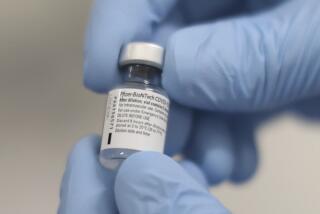USC to Start Testing of Breast Cancer Vaccine : Medicine: In Canadian experiments, the treatment has extended patients’ life spans twice as much as chemotherapy. Researchers predict a ‘significant advancement.’
- Share via
The first U.S. trials of a promising new therapeutic breast cancer vaccine developed in Canada will begin next week at USC’s Kenneth J. Norris Jr. Comprehensive Cancer Center, researchers said Monday.
In preliminary safety trials conducted in Canada, the vaccine extended the life span of victims of metastatic breast cancer by about twice as much as conventional chemotherapy, said Dr. Malcolm S. Mitchell of USC, who will head the trials.
Unlike conventional vaccines, which prevent disease, cancer vaccines are used to fight the disease once it is entrenched in the body. Mitchell hopes that the different doses of the vaccine to be used in the USC study will be more effective than in the Canadian study in halting or perhaps reversing the spread of the cancer.
“We believe that this vaccine may offer a significant advancement in the treatment of cancer,” Mitchell said at a news conference Monday. Researchers are particularly enthusiastic over the vaccine because, unlike chemotherapy, it has relatively few side effects that degrade the patient’s quality of life.
Breast cancer is the most common form of cancer in women, affecting an estimated 182,000 this year. Overall, one in eight women will develop breast cancer during their lifetimes. Although it has a cure rate of up to 90% when detected in its earliest stages, breast cancer will kill an estimated 46,000 women this year.
The new vaccine was developed by immunologist B. Michael Longenecker of the University of Alberta. It is unique in that it is based on a sugar molecule rather than a protein. Conventional wisdom among immunologists has long been that a vaccine must be based on a protein to be effective.
The sugar used in the vaccine is found on the surface of cancers of the breast, ovaries, pancreas and colon, but not on the surface of healthy cells.
Injecting the sugar alone is not enough to provoke an immune response. To attract the immune system’s attention, Longenecker attached it to a mollusk blood protein that is widely used for that purpose. That molecule then is administered in combination with another compound that further stimulates the immune system.
The body then produces antibodies against the sugar that destroy tumor cells. Studies in animals have shown that the vaccine significantly reduced the size of tumors of the breast, as well as those of the colon, ovaries and pancreas.
Longenecker conducted Phase 1 safety trials in 13 Canadian women who had breast cancer that had metastasized--spread to other parts of the body--but in whom the spread was limited.
The vaccine had no effect in the three women with the most metastases, but temporarily halted the cancer’s progress in the other 10 for periods ranging from 4 1/2 to 27 months. Seven of the women are alive, an average of 22 months after they began receiving the vaccine. In contrast, breast cancer victims with metastases who receive chemotherapy typically survive for about 11 months.
Three of the vaccine recipients remained stable, with no progression of their disease--one for 27 months, one for 25 months and one for 13 months, according to Alex McPherson, president of Biomira Inc. of Edmonton, Canada, which makes the vaccine and sponsored the trials.
Similar results have been obtained in Phase 1 studies with colorectal, ovarian and pancreatic cancer, and Phase 2 efficacy trials against those cancers have begun in Canada and England.
Mitchell plans to enroll 45 women in the breast cancer trial, all with some metastases. They will be divided into three groups, each of which will receive a different dose.
The vaccine is injected at the start of the trial and during the second, fifth and ninth weeks thereafter. Women who are doing well will then receive it monthly for four months and bimonthly thereafter.
McPherson said he hopes all trials will be finished and federal Food and Drug Administration approval will be given within 2 1/2 to 3 years.
Information about the trials is available by calling (800) 4-VACCINE.
October is National Breast Cancer Awareness Month, in which a number of organizations are encouraging women to perform self-examinations and to undergo testing.





